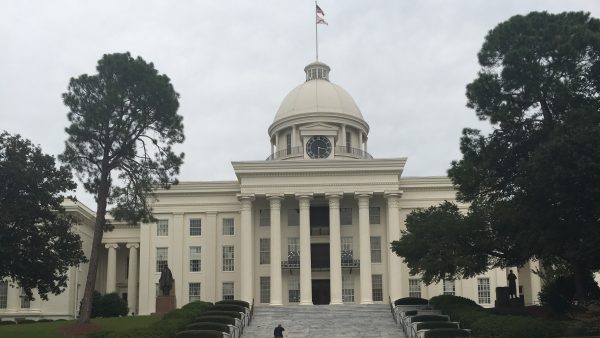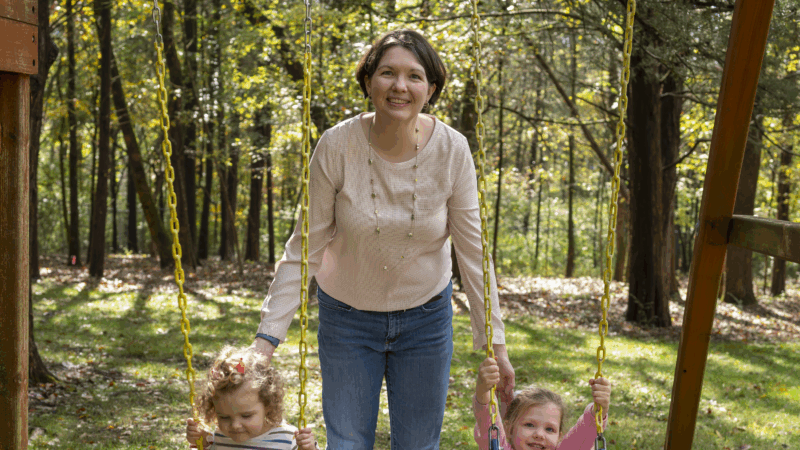Peace in the South
It’s early on a Saturday morning and organizers with the Birmingham Peace Project are taking care of last minute details before their bus leaves for a peace march in Atlanta. It may be gray and rainy outside, but inside the bus, the mood is relaxed and cheerful.
(singing “We all live in a terrorist regime”)
“I value what there is here, greatly, the people that get together, even though there is a small minority, to come together and do this…”
Peace activist Joyce Smith grew up in Alabama and worked here as a teacher. But she’s also lived outside the South and says the peace movement gets more traction in other places.
“I do think there are a lot of people in the South that are against the war, but, for one reason or another, don’t want to speak out against it. I did, however, live in Oregon and people did speak freely and frequently spoke out against the war, so there was always an opportunity…”
“This is after all a hierarchical and patriarchal society and in such societies, doing what your told, obeying the established authorities plays a really strong role in the culture.”
Alabama historian Wayne Flint says there are many reasons the peace movement might be an uneasy fit in the South:there’s the South’s sense of nationalism, a history of outdoor hunting and dueling when one’s honor is challenged…But one reason really gets him going: economics.
“The Southern states as a whole, the Deep South in particular, Alabama most notably have disproportionately high rates of poverty. And wherever you have poverty, you have…very high rates of people participating in the military. People who cannot go to college, cannot flourish in other economic and educational activities often go to the military…”
Flynt believes the military presence in the South–that’s both people who grew up here and military officers who retire here from other places-contributes to an environment where people holding anti-establishment views may be less likely to speak out.
“Because so many soldiers and military personnel come from this area; I think it becomes much more difficult for people to stand against what their sons, daughters, spouses, brothers, sisters are doing.”
Local attorney David Gespass is chairman of the Birmingham Peace Project.
“It’s really, just emotionally difficult for someone to say that a loved one is in harm’s way, is killing and subject to being killed, unless the cause is just and noble.”
Wayne Flynt agrees. He says rather than looking at the war as merely a policy issue, people in the South make it personal.
“A peace activist is not just somebody who says government’s policies are wrong. In the South such a person is seen as a…traitor to the country…”
If they know they’re seen as traitors, you can’t tell from the way they’re behaving at the peace march in Atlanta. More than 3700 activists walk from the King Center to Piedmont Park singing loudly, dancing, and holding up banners. The group is diverse-there are people of different ethnicities and ages. High schoolers walk alongside aging hippies. A cutout of Martin Luther King bobs through the crowd.
Still, the number of peace marchers pales in comparison to the estimated 50,000 demonstrators who showed up this week in Atlanta for an immigration rally. For many, the immigration issue is alive in this country. The war, though waging on, is far away.
The 2026 Alabama legislative session begins Tuesday
State lawmakers will return to Montgomery Tuesday to kick off the 2026 legislative session. It's the final session for Gov. Kay Ivey. It also comes against the backdrop of statewide elections this fall. For a look ahead to what to expect this session we turn to Todd Stacy, host of Capital Journal on Alabama Public Television.
Who are the figure skaters representing Team USA? Key names and backstories to know
Sixteen U.S. figure skaters are competing in all four Olympic disciplines: men's, women's, pairs and ice dance. The team includes a mix of seasoned vets, world champions and rising stars.
Exercise is as effective as medication in treating depression, study finds
New research shows exercise is as effective as medication at reducing symptoms of depression. And you don't need to run a marathon to see benefits. So how much is enough?
How IVF has led to a record number of single moms in their 40s
Who gets to be a parent has been reshaped by IVF: Single women in their 40s are increasingly opting to become moms.
Marrying for health insurance? The ACA cost crisis forces some drastic choices
While Congress debates bringing back Affordable Care Act subsidies , many Americans have already made life-altering decisions to afford health care.
Celebrities wear pins protesting ICE at the Golden Globes
Some celebrities donned anti-ICE pins at the Golden Globes on Sunday in tribute to Renee Good, who was shot and killed by an Immigration and Customs Enforcement officer last week in Minneapolis.







